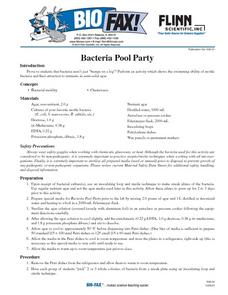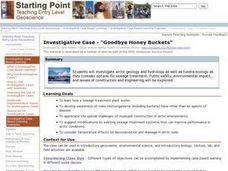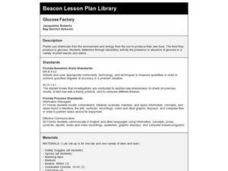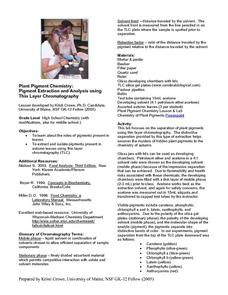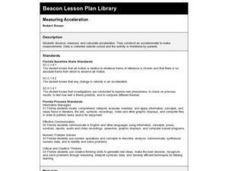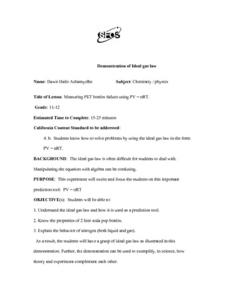Curated OER
Determining Acids and Bases
Students use purple cabbage indicator to test five know substances for acidic/alkaline balance. They discuss the safety precautions required both inside and outside a lab in handling acids and bases.
Curated OER
Icecream in a Baggie
Students apply their comprehension of colligative properties to real-world situations. They review the concepts of physical and chemical changes. Students are reminded that science is used extensively in food-production. They are...
Curated OER
How Many Bacteria on Your Food?
High schoolers discuss and conduct a food safety experiment which looks at bacteria and food poisoning. They swab the other area of some food and grow bacteria in an agar plate.
Curated OER
On the Microbe Trail: An Introduction to Bacteria and Aseptic Technique
Tenth graders predict the conditions necessary for bacterial growth, test their predictions and at the same time practice the aseptic techniques and safety procedures needed when working with bacteria.
Curated OER
Chemistry: Renewable and Nonrenewable Energy
Students research on renewable and nonrenewable resources. In this chemistry lesson, students design and build solar panels. They evaluate their device and write a lab report.
Curated OER
World of Protists
Students observe a jar of pond water and predict how much life they think exists in the jar and watch a "Bill Nye: The Science Guy" video regarding protists. They participate in an online virtual pond dip where they begin to familiarize...
Curated OER
Conductive Heat Transfer Experiments
Students conduct a variety of experiments to see how heat is transferred using common household objects. The teacher uses the safety plans included in the lesson plan. This is ideal for inexperienced Science teachers.
Curated OER
Pursuit of The Properties of Metals and Nonmetals
Learners examine how every element is classified based on the physical and chemical properties. In this properties of metals lesson students divide into groups, complete a lab and finish a data sheet.
Curated OER
The Solar System: Why do we Explore?
Third graders act as scientists. In this property discovery lesson, 3rd graders explore the substance "Oobleck" (cornstarch, water, food coloring). They work in groups to investigate the substance and make observations as a scientist...
Curated OER
Bacteria Pool Party
Students investigate the organisms of bacteria. They are given a culture of bacteria that can be observed under a microscope. The students make observations that are recorded. The lesson includes the mention of specific safety...
Curated OER
Goodbye Honey Buckets
Pupils investigate arctic geology and hydrology as well as tundra ecology as they consider options for sewage treatment. Public safety, environmental impact, and issues of construction and engineering be explored.
Curated OER
Glucose Factory
Fourth graders determine, through laboratory activity, the presence or absence of glucose in a variety of plant leaves and stems. They work in groups and perform a three part laboratory which shows them how plants convert sunlighht to food.
Curated OER
Does the increased use of fertilizers effect biodiversity?
Students conduct a hands-on lab activity in which they analyze a sample of water from a local stream or pond. They introduce a fertilizer solution into the sample and analyze and describe their findings.
Curated OER
Plant Pigment Chemistry
Students discover the roles of pigments present in leaves. They extract and isolate pigments present in autumn leaves using a thin layer chromatography. Very nice lesson and lab!
Curated OER
Strawberry DNA Extraction
Students explore the DNA of strawberries. In this science lesson plan, students extract the DNA of strawberries. Students complete a lab report.
Curated OER
Plant Classification
High schoolers share with the class how they think plants are classified and are assessed on their prior knowledge. They use a packet to complete throughout the week at their own pace, which includes various activities to familiarize...
Curated OER
The pH scale
Students list the common properties of acids and bases. They classify substances as acids or bases, by using pH and litmus tests and are able to explain the pH scale. They participate in a lab activity which reinforce their understanding.
Curated OER
The Internal Anatomy of the Grasshopper
Sixth graders explore the internal organs of grasshoppers. They determine the function of the organs through a dissection activity.
Curated OER
Measuring Acceleration
Learners create an accelerometer and take measurements of acceleration in a moving car. They study the car speeding up in a straight line, slowing in a straight line and curving at constant speed. They prepare a lab report showing...
Curated OER
Demonstration of Ideal Gas Law
You know that liquid nitrogen turns into a gas at room temperature. Place some in a two-liter bottle for a physics demonstration of the ideal gas law. Beware, however; this is a dangerous demonstration! Not to mention that you may not...
Cornell University
Nano What?
The size of a nanoparticle is difficult for pupils to grasp. A hands-on experiment is designed to give your classes perspective. Learners analyze different sports drinks for the content of electrolytes as an introduction to nanoscale....
Teach Engineering
Investigating Contact Angle
Discover the properties of water-loving and water-hating surfaces. In the seventh installment of a nine-part series, scholars explore hydrophilic and hydrophobic surfaces by conducting an experiment. They observe surface coatings,...
Beyond Benign
Catalysts and Oxygen
Here is an engaging and hands-on lesson plan that allows high school chemists to demonstrate the effects of a catalyst on various chemicals. They garner knowledge of how reactants and products differ from one another, while...
National Nanotechnology Infrastructure Network
Understanding Wave Motion - Slinky vs. Snaky: Which Spring is Dominant?
Ride the wave to an understanding of refraction! The first in a series of two inquiry-based lessons challenges learners to create transverse waves with two different types of springs. As their wave hits an object, they observe the change...











